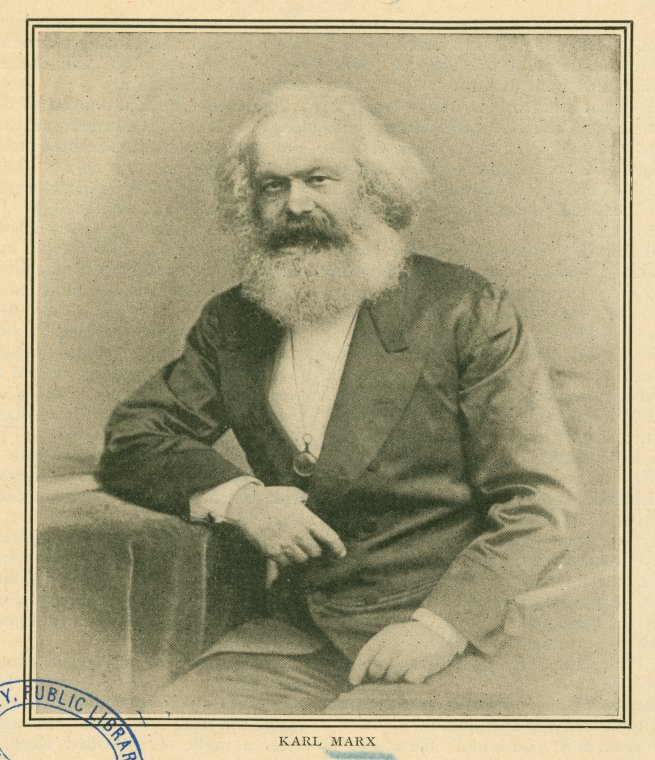Liberty Matters
If Not Marx, Then Whom?
 I ended my original comment to Virgil Storr by saying, "In conclusion, if comprehensive planning, of any variety, is epistemically impossible, then Marx's view of man is false and his scientific critique of capitalism, as well as its normative implications (if any), is completely misguided. Critics of capitalism may do best by looking elsewhere."
I ended my original comment to Virgil Storr by saying, "In conclusion, if comprehensive planning, of any variety, is epistemically impossible, then Marx's view of man is false and his scientific critique of capitalism, as well as its normative implications (if any), is completely misguided. Critics of capitalism may do best by looking elsewhere."I'd like to now take this opportunity to clarify what I mean by my last sentence. Virgil sees a sense of morality and justice in Marx that still animates and inspires today's critics. I've argued that it is not really there, but I do acknowledge that people find meaning in texts that go beyond the intention of their original authors. That said, even the late Tom Bottomore lamented:
There is one obvious lack in Marxist thought which I have constantly emphasized, namely the absence of anything that could be called a Marxist ethical theory. I don't understand how a theory of society which is so intimately connected with socialism as a movement aspiring to some new and better form of society, has failed to make a larger contribution to the elaboration of a moral doctrine, to the principles of what Gramsci called a "new civilization." Yet there has never been a great Marxist moral philosopher. Some Marxists have written about Marxism and morality, and there are elements of a moral theory in some discussions of alienation, but there is nothing, I think, which occupies a central place in what anybody would read if they were looking at the major expositions of moral philosophy. [Taylor and Outhwaite 1989, 395]
For this and for a variety of other reasons already discussed in this forum, it is probably not productive for contemporary socialist critics of capitalism to turn to Marx himself.
If not Marx, then whom? I'm surprised that Eduard Bernstein does not receive a larger hearing and recognition among contemporary progressives and democratic socialists. His Evolutionary Socialism (1961 [1899]) seems to fit much of their ideal, and, indeed, many of the reforms that he called for have actually emerged in 20th-century capitalist systems. Of course, Bernstein's reformist and meliorist position would be completely attacked and discredited from a Marxist position in Rosa Luxemburg's Reform or Revolution.(1970 [1899]) That said, Bernstein's most-often quoted line should have great appeal, it seems to me, among contemporary democratic socialists in the United States:
But with respect to liberalism as a great historical movement, socialism is its legitimate heir, not only in chronological sequence, but also in its spiritual qualities, as is shown moreover in every question of principle in which social democracy has to take up an attitude [149].
Be that as it may, the most valuable contemporary literature, to me, comes out of the Amherst School of post-Marxism. Although a (revamped) theory of exploitation remains, very little is discussed about alienation (with its associated problems) anymore. (This may be an Althusserian influence whereby the "early" Marx is largely rejected.) I believe that serious Marxist-inclined contemporary critics of capitalism would find important arguments in Resnick and Wolff's New Departures in Marxian Theory. (2006; Wolff's less scholarly book, Democracy at Work: A Cure for Capitalism [2012], itself has drawn a wide readership.)
All of us here are familiar with Ted Burczak's important book, Socialism After Hayek.(2006) In it he raises issues of appropriative and distributive justice that we don't really find in Marx. At the same time, it satisfies Bottomore's concerns mentioned earlier. Better than returning to Marx himself, I think contemporary critics of capitalism should read Ted's book. Indeed, I have recommended it to some of my own students.
Finally, I think the most important book to have come out of this tradition in the past decade is Burczak, Garnett, and McIntyre's edited collection, Knowledge, Class, and Economics: Marxism Without Guarantees.(2018) The subtitle says a lot: the Grand Narrative (which so much of the Marxist aesthetic was tied to) appears to have been discarded. The hard questions now remain. Ted even speaks about "Catallactic Marxism" in one of the chapters.
Exactly 30 years ago I wrote: "I believe these new debates are a healthy alternative to the monolithic position held by the orthodox Marxist earlier in the twentieth century. I will leave it up to the Marxists themselves to decide which position is more consistent with what Marx himself 'really meant.'" (1988, 33) And that was before I came across the work of my Amherst colleagues mentioned above. I am even more confident in my claim today.So, yes, I believe the socialist criticisms of capitalism would do far better by not focusing so much on Marx's original works but on the works of others who came after Marx: perhaps Bernstein, but even more so the post-Marxists of the Amherst School. Of course, my recommendations are not only made for some of my own students and a handful of readers on this site, but for all of us in this exchange – Boettke, Hart, Horwitz, and Storr, too.
We have a lot to learn and much work to do.
Copyright and Fair Use Statement
“Liberty Matters” is the copyright of Liberty Fund, Inc. This material is put on line to further the educational goals of Liberty Fund, Inc. These essays and responses may be quoted and otherwise used under “fair use” provisions for educational and academic purposes. To reprint these essays in course booklets requires the prior permission of Liberty Fund, Inc. Please contact oll@libertyfund.org if you have any questions.